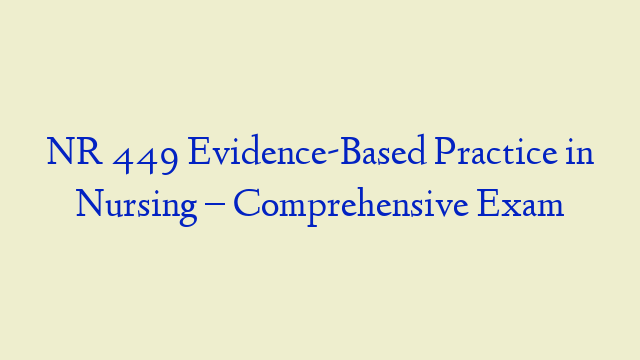Description
NR 449 Evidence-Based Practice in Nursing – Comprehensive Exam Practice MCQ’s
- Nursing research is significant to the profession of nursing because it promotes what?
- Which aspect of the scientific investigation of nursing practice is also a fundamental concept of American Nurses Association (ANA)’s Code for Nurses?
- Nurses who do not conduct research need to understand the nursing research process for which of these reasons?
- Which of these actions demonstrates the role of a knowledgeable consumer of nursing research?
- Members of the nursing staff are to participate in a unit-based clinical research study. Which research-related actions would be expected of a nurse with a baccalaureate nursing degree?
- Which statement describes the role of the nurse in research?
- What is the primary value of evidence-based nursing practice?
- A novice nurse researcher is comparing the processes used in nursing research and evidence-based practice. What differences, if any, exist between the two processes?
- A nurse is analyzing a research article. Where in the article is the nurse likely to find the research question and study purpose?
- The nurse researcher is conducting a research study using subjects who will be interviewed regarding their experience with postpartum depression. For which of these reasons would the researcher selects a qualitative, rather than quantitative, research design?
- The nurse is analyzing a research article. To determine if an integrative review was performed as part of the study, the nurse must understand that this type of review is what?
- When assessing the strength of a body of evidence used in a research study for consistency, the nurse should determine what?
- The nurse is analyzing a qualitative research article. In which section of the article is the nurse likely to find a summary of legal-ethical issues considered in the study?
- The nurse is analyzing a qualitative research article. In which section of the article should the nurse expect to find a discussion of the research findings?
- The nurse is using the critical reading process to analyze a research article. The nurse identifies the main theme of the article and states it in two sentences, using the nurse’s own words. The nurse is using a strategy to promote which type of understanding?
- The nurse is using the critical reading process to analyze a research article. The nurse is using a list of criteria to determine how well the researcher performed each step of the research process. The nurse is using a strategy to promote which type of understanding?
- Which of the following is a critical step for the quality improvement process in health care settings?
- Which statement(s) describe the actions of the baccalaureate nurse graduate as a participant in the nursing research process? (Select all that apply.)
- Which aspects of the nursing research process are common to nurses at all educational levels? (Select all that apply.)
- All nurses can be a part of a clinical team that applies research to practice.
- Developing nurse researchers at a younger age is a priority for the future in the nursing profession for which reasons? (Select all that apply.)
- What difference, if any, exists between a research question and a hypothesis?
- How is a hypothesis related to a theory?
- A nurse makes these statements. Which one has the greatest potential as an area of nursing research?
- The nurse has identified a clinical problem as a potential research question. Which of these steps should the nurse take next?
- In a research study, what are the properties of interest that differ in value?
- A nurse researcher proposes a study of teenage mothers and their experience with postpartum depression. Which of these considerations would affect the feasibility of the study?
- What is the key difference between independent and dependent variables?
- When designing a research study, the nurse should have which of these understandings about independent and dependent variables?
- A nurse’s research question is, “How does maternal employment among health care professionals affect infant health during the first 6 months of life?” In this question, what is the dependent variable?
- A nurse has defined the research question as, “How does oral nutritional supplementation during dialysis treatments affect the serum albumin levels of adult patients who have chronic kidney disease Stage 5?” In this question, what is the independent variable?
- A nurse has defined the research question as, “Is there a relationship between self-esteem and body weight among postmenopausal women?” What type of research-question format (or research design) is implied by this question?
- A nurse has defined the research question as, “What is the lived experience of late-stage pregnancy loss among women older than 35 years?” What type of research-question format (or research design) is implied by this question?
- Which research question is testable as currently written?
- What is the purpose of a hypothesis for any study?
- Which hypothesis fails to meet the criteria of testability?
- Which hypothesis is nondirectional?
- The nurse has defined the hypothesis as, “There will be no difference in the number of adverse events among patients discharged two days after an abdominal hysterectomy compared with patients discharged 4 days after an abdominal hysterectomy.” This statement is an example of what?
- The nurse notes these statements in a research article:
- A nurse states the purpose of a research study as, “This study will compare the effect of warm and cold applications on the resolution of intravenous (IV) infiltrations in hospitalized older-adult patients in the early postoperative period.” In this statement, what constitutes the independent variable(s)?
- A nurse describes the hypothesis of a research study as, “There is a positive relationship between nurses’ attitudes toward AIDS patients and the number of AIDS patients they have cared for in practice.” This statement is an example of what?
- The nurse has identified a patient situation that may be an area for study. The initial review of the literature helps the investigator to identify what?
- Which hypothesis would be classified as a statistical hypothesis?
- Which of these statements is correctly phrased as a clinical question for evidence-based practice?
- The review of literature is important to the research process for which of these reasons?
- The “6S” pyramid hierarchy of preappraised evidence developed by DiCenso, Bayley, & Haynes (2009) provides a means to help nurse consumers of research find pre appraised evidence for clinical questions. Using this model, which level of evidence would be highest?
- For which of these reasons would a nurse researcher include refereed journals in the literature review?
- A research article has undergone a blind review for a peer-reviewed journal. The nurse reading the research article should understand which of the following about this review process?
- For which of these reasons would a nurse researcher decided to use secondary sources in a review of the literature?
- Which is an example of a primary source in a literature review?
- Which is an example of a secondary source in a literature review?
- Which of these electronic databases is the most relevant and frequently used source for nursing literature?
- When comparing MEDLINE & CINAHL databases, which difference will the nurse find?
- A general timeline for a literature search for an academic paper or project is to go back how far in the literature?
- A nurse is encouraged to use a Boolean operator to more efficiently perform an electronic search of the literature. The nurse should understand that a Boolean operator is what?
- Which command is an example of a Boolean connection used when ordering an electronic literature search?
- Which website is an important source for clinical evidence but limited as a provider of primary documents for literature reviews?
- What is considered to be essential to a thorough and relevant review of the literature?
- Which objective of a review of the literature is unique to a review for research purposes, rather than a review for evidence-based practice?
- Which of these factors limits the usefulness of the World Wide Web as a source of information for research consumers?
- When the nurse researcher conducts an electronic literature search, the search yields more than 7000 citations for the topic. The researcher should make which of these interpretations of the findings?
- Why would a nurse researcher choose to use multiple online fee-based databases such as CINAHL and MEDLINE?
- A study published in a nursing research journal is titled, “Effects of nocturnal hemodialysis on physiological and psychological parameters of patients with end-stage kidney disease.” The nurse should recognize that this study belongs to which of these types of reference?
- Literature reviews are usually organized according to what?
- Which phrase correctly defines a theory?
- In which way are theory and practice interrelated for the hospital-based nurse researcher?
- Which nursing theory is classified as a Grand Nursing Theory?
- Situation-specific nursing theories are becoming more popular in nursing research for which of these reasons?
- A graphic or symbolic representation of a phenomenon not directly observable, which allows the reader to visualize key constructs and their interrelationships, is called what?
- How is a model related to a concept or concepts?
- Pender’s health promotion model is an example of what type of theory?
- Which statement is an operational definition of a concept?
- When reading a report of the results of a nursing research study, the nurse notices that the theoretical framework is drawn from a discipline other than nursing. When critiquing the theoretical framework, the nurse should determine the answer to which of these questions?
- Which research report title suggests that theory was generated as the outcome of the study, rather than being used as the framework for the study?
- Which research report title suggests that theory was used as the framework for the study, rather than being generated as the outcome of the study?
- When critiquing a research study’s theoretical framework, the nurse should keep in mind which information? (Select all that apply.)
- The measures used by a nurse researcher to maintain uniformity of conditions in a quantitative research study refer to which aspect of the study?
- What is the overall purpose of the research design in a quantitative research study?
- In which of these ways does the nurse researcher’s literature review help select the appropriate study design?
- When reviewing a research report, the nurse determines that all aspects of a study systematically and logically follow from the research problem. Which condition has been met?
- Which factor is most likely to be a mediating variable in a study to determine if high doses of vitamin C help reduce the subjects’ susceptibility to influenza?
- A nurse researcher is designing a quantitative research study involving a specific group of patients admitted to local hospitals. Which factor would negatively affect the feasibility of this study?
- A nurse is designing a study to determine whether a videotape or a written pamphlet is more effective in teaching young women how to perform a breast self-examination (BSE). Which of these actions would provide the best control for a mediating variable?
- How would a nurse researcher ensure that the sample used in a quantitative study is homogeneous?
- How could a nurse researcher’s use of a homogeneous sample weaken a research study?
- Why should a nurse researcher want to limit or eliminate extraneous variables in a study?
- When should a nurse researcher include an extraneous variable as part of a study’s design?
- A study is examining the effect of a new antilipemic drug, compared with placebo, on lipoprotein levels in postmenopausal women. Which of these actions represents the researcher’s attempt at consistency in data collection to control extraneous variables?
- A nurse researcher assigns half a study sample to an experimental group and the other half to a control group. What does this action represent?
- For which of these reasons would a nurse researcher choose to assign subjects randomly to groups in a study?
- A nurse researcher assigns subjects to experimental and control groups in such a manner that each subject in a population has an equal chance of being selected. What is the researcher using?
- The issue of control would be less important in a quantitative study with which type of research design?
- Which situation represents a threat to internal validity in an experimental study measuring the effect of a videotape of discharge instructions for patients who underwent coronary artery bypass graft (CABG) surgery?
- The nurse researcher designed a study examining anxiety among elementary school children. If a widely publicized murder of a child occurred in the city during the time frame of the study, what type of threat to internal validity would the murder represent?
- A nurse researcher should consider mortality a threat to the study’s internal validity for which of these reasons?
- A nurse researcher can control for selection bias in a study by taking which of these actions?
- External validity refers to which of these issues?
- Which of these situations describes a reactive (Hawthorne) effect?
- A nurse researcher is investigating the effect of type of operating room mattress and surgical position on tissue interface pressures in healthy young adults. Which component of research is most affected by the choice of subjects?
- What action by a nurse researcher will help eliminate bias on the dependent variable?
- A nurse researcher is planning to write a proposal for a research study using a quantitative design. To maintain control in the study, the nurse should include which elements? (Select all that apply.)
- A nursing student is reviewing a research study in which researchers used a pretest/posttest design to examine the effect of an AIDS education intervention on teenagers’ knowledge about the condition over a school year. What threats to internal validity could be present? (Select all that apply.)
- What should the nurse researcher consider when determining the feasibility of a research question? (Select all that apply.)
- Which factors would be considered threats to internal validity? (Select all that apply.)
- The nurse is critiquing a research study that used an experimental design. How can the nurse determine if the study’s results are able to infer causality?
- The nurse is critiquing a research study that involves subjects undergoing chemotherapy for breast cancer. Which finding would meet a criterion for inferring causality between performance of exercise and adaptive behavior of the subjects receiving chemotherapy?
- The experimental treatment initiated by the researcher can be described as what kind of variable?
- Which of these criteria is most important when evaluating the results of an experimental research study?
- Compared with a quasi-experimental design, which of these characteristics should a nurse expect to see only in a true experimental design?
- Which factor should be the primary consideration when determining the validity of experimental study findings?
- In which way is the independent variable handled differently in a study with a true experimental design compared with a study with a quasi-experimental design?
- Random assignment of subjects to experimental and control groups has which of these effects?
- Randomization strengthens an experimental study in which of these ways?
- Control is important in an experimental research study for which of these reasons?
- In a true experimental study, the control group is the group that does what?
- Which action would increase the control of an experimental study?
- A study of a program to help people quit cigarette smoking had three groups of subjects. The first group received one supportive phone call 10 days after attending a program on strategies to resist smoking. A second group received a supportive phone call every week for 6 weeks after attending the program. A third group received no supportive phone calls after attending the program.
- A study of a program to help people quit cigarette smoking had three groups of subjects. The first group received one supportive phone call 10 days after attending a program on strategies to resist smoking. A second group received a supportive phone call every week for 6 weeks after attending the program. A third group received no supportive phone calls after attending the program.
- What type of threat to validity is minimized by the use of a Solomon four-group design?
- An after-only nonequivalent control group design would be appropriate to study which of these research questions?
- A quasi-experimental study design would be a better choice for a research study than an experimental study design in which of these situations?
- The nurse researcher is planning a study in which subjects will not be randomly assigned to groups. Which type of design would be appropriate for this study?
- A planned quasi-experimental study using a nonequivalent control group design has several extraneous variables that threaten its internal validity. The nurse researcher’s actions should be based on which understanding?
- A quasi-experimental research design would be preferable to an experimental design in which of these situations?
- A study was conducted to determine if videotaped instruction was more effective than written instructions (a pamphlet) to teach menopausal women the benefits of regular mammograms. Which condition would be considered an antecedent variable?
- In a study using a true experimental design, which of these methods would control for antecedent variables?
- How are threats to validity affected when studies are conducted in real-world settings?
- How are threats to validity affected when studies are conducted in laboratory settings?
- Which are characteristics of quasi-experimental research designs that are considered weaknesses, compared with experimental designs? (Select all that apply.)
- A research study in a laboratory setting incorporates 4 groups (2 control and 2 experimental) in which only 1 experimental group and 1 control group are pretested, while all 4 groups are post tested. Which descriptions of the design are accurate? (Select all that apply.)
- A nurse researcher is planning a quantitative (experimental) research study to test the effect of a new wound product on wound healing. Which of these factors is necessary to implement an experimental pretest-posttest design? (Select all that apply.)
- A research study is planned to determine the effect of nutritional supplementation and type of
- support surface on the rate of wound healing in sacral myocutaneous flap failures. Which is an independent variable in this study? (Select all that apply.)
- Which research designs could be classified as experimental? (Select all that apply.)
- Which research designs could be classified as quasi-experimental? (Select all that apply.)
- What is the first question that should be asked in determining whether a cross-sectional design or a longitudinal design should be used in a quantitative study?
- Which data collection method is most appropriate for an RN researcher to use in a survey study?
- Why would a nurse researcher choose to use research studies that examine the associations or relationships between variables?
- Why would a nurse researcher choose not to use a survey study design?
- A nurse researcher would choose to use a correlational study of multiple variables for which purpose?
- Why would a nurse researcher choose to use a correlational design for a nonexperimental study?
- A nurse researcher will choose to use a developmental study design to do what?
- Which statement about cross-sectional studies is most accurate?
- A nurse researcher would decide to use a longitudinal or prospective design for which reason?
- A nurse researcher would decide to use a retrospective or ex post facto study for which reason?
- A nurse researcher will choose an ex post facto design over more a correlational design for which reason?
- Which type of study should be used when data are collected at only one point in time?
- Data collection instruments were sent to the same sample of women at six different times during the first year of living with breast cancer. What type of study design does this exemplify?
- What threat to internal validity is most closely associated with a longitudinal design?
- What study design allows study participants to serve as their own controls, allowing early trends in the data to emerge?
- The longitudinal study and the prospective study are similar for which reason



